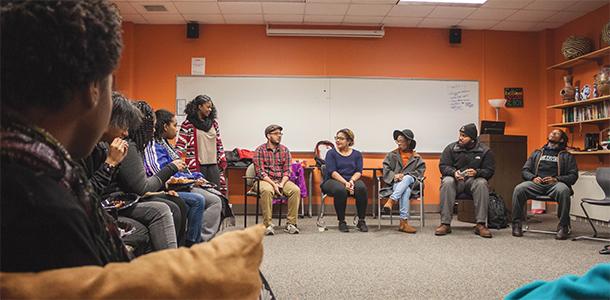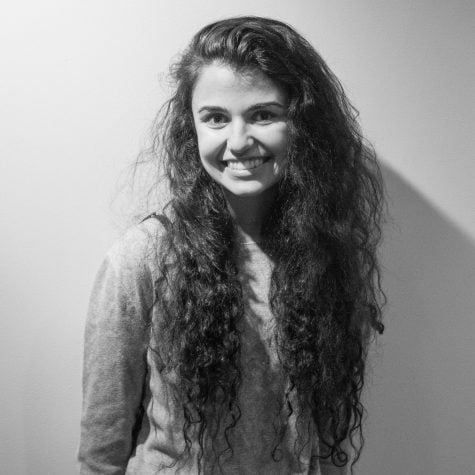Each seat was full in the Multicultural Education Center as students and faculty sat in a circle among four student panelists waiting to hear them answer one question.
On Feb. 10, Blacks Unifying Society hosted one of many events for Black History Month, a panel on the question: “Who’s Black?”
Each panelist had a different answer.
“Blackness is the power of an oppressed group of people to turn (oppression) into something beautiful,” said sophomore panelist Iris Suarez at the event.
Others had a different definition of what blackness meant to them.
“When I think of being black, I think of my mom,” said first-year event attendee Celene Warren. “She’s such a strong, independent woman.”
Others still continue to contemplate what blackness means to them.
“A lot of things in life, I’m still learning,” said senior BUS board member and panelist Marcus Williams. “What I perceive as being black and what others perceive as being black, I’ve learned, is completely different. I’m still trying to figure it out.”
The panelists also spoke about their experiences being told they were not black enough.
“I’m not cisgender, and I’m not heterosexual,” said first-year Queer People of Color board member and panelist Terry Daniels at the event. “People don’t think my blackness and queerness go together, (but) I’m not just queer. I’m black.”
The question prompted others to speak about their lives as well.
“I’ve always struggled with my blackness because I grew up in a white family, but I am black,” said first-year Honey Jones. “So many people have told me I’m not really black, but I’m like, well what does that mean? How can you tell me that?”
The conversation about intersectionality continued, as many felt that every part of them informs their blackness.
“It’s not just one community because all communities have intersections,” said first-year attendee Sojourner Davidson. “I’m also queer, and I also have disabilities. These things also inform my identity and are things that affect my life.”
Some had the opportunity to speak on how the black American community feels foreign to them, even as someone who is perceived as part of that group.
“Being an African and being a black person are two different things with a similar history,” said senior attendee and Cameroonian native Teresa Bedzigui at the event. “Cameroonian culture, my tribe’s culture, is different than black American culture.”
This stuck with many of the students after the event as well, including senior panelist Noah McDonald.
“I enjoyed listening to black students from other countries and their experiences navigating the race politics of the United States,” said McDonald in an email interview. “Black students at Guilford have a diverse array of lived experiences. Sharing those stories with each other helps us to bridge social and political gaps between members of the diaspora.”
Attendees also spoke on their favorite part about being black.
“It’s been a difficult journey … but that point of loving yourself for the first time … that’s one of the greatest things about blackness,” said senior BUS board member Jennifer Thomas.
The event is one of many happening in February for Black History Month. Other events include the Mosaic Leadership Series on Feb. 22 and The Element: Poetry event on Feb. 26.
“I hope to continue to have spaces like this, where we can continue to talk about anything, like current events and even widening the conversation about what it means to be black,” said attendee De’shauna Ottley ’15.
Upon reflecting on the event, BUS advisor and LGBTQQA Coordinator Parker Hurley was excited about the opportunity to talk positively about blackness.
“We’re always having conversations about blackness retroactively or from a place of guilt or fear or one that doesn’t necessarily center our experiences and leadership,” said Hurley. “It gave us an opportunity to decenter whiteness in a real way.”
As Black History Month continues, students are excited to have a space for them to talk about being black.
“It is important that black students on campus have safe spaces where we can socialize and connect,” said McDonald. “A space for black students is valuable in helping us feel more comfortable and healthy on campus.”
Students came away from this event with knowledge, an understanding of other’s experiences and many questions to think about.
“It’s a privilege to be black,” junior attendee Najha Zigbi-Johnson said at the event.













